V O L U M E
I I I
S I X TY - O N E
A N N O
S T E L L A E
P A R T
I I -
P A R T
I I I

Argo Unrequited
The forty-nine warriors that guarded Quinn the Bluebird in his sleep might have been his fellow mariners on board the ARGO of Argus and Jason, only they came only they were needed, and they never showed themselves to him.
The traders navigated the whole Turtle Sea, it seemed to Quinn, as the voyage lengthened. He had never been more than forty or fifty miles from home, so he had not guessed the vast distances it took to sail over from one end to another of the Turtle Sea.
The trading canoe was slow, and was always stopping to barter for this and that, and to seek game or other food for themselves and the passengers. This also lengthened the voyage. As time went on, Quinn realized that there was no direct route for these traders. They had no desire to return home to port in the northern land without gaining as much as they could along the way from trade. The beads they carried for highly valued everywhere, and they brought out wooden chests of beads, which were half full at the Brazos, and still needed to be emptied in exchange for whatever they could get in trade. They also had a stock of copperware, both for cooking and for cutlery and ornaments--for copper had never stopped having many practical and ornamental uses.
Sometimes the traders stopped at a large village on the shore just to spend time with the village women, which they brought on board as often as they could. Quinn hated these stops, and thought many times of leaving the canoe and going on alone. But he knew nothing of the foreign lands he was seeing for the first time. He never once felt he should leave the canoe, and so he remained, though he distrusted and dispised the traders for the way they treated women and even those they traded with, cheating them whenever they could.
He saw them laugh among themselves on board, after a time of trading ashore, and by their expressions and how they acted out what they had done, he understood that they had successfully cheated the people. The cracked, chipped, and faulty-made beads they sorted out for discarding had been traded to the poor, but they kept back the silver and gold-glazed glass beads. He watched them even glaze wooden beads with a paint like gold or silver and pass them off as their most valuable stock. They were growing richer and richer, as the voyage transpired, by defrauding everyone they could!
Yet these same men were most pious. They spread their prayer mats and prayed the obligatory five times each day, kneeling on the mats and pressing their foreheads to the deck, while facing their holy city, Seal Town. In times past, they had faced the opposite direction, toward the Southeast, but the War of the Fallen Empires had changed the direction--the Holy City in the Southeast no longer existed, while Seal Town, still clung to life on the slopes of the Mountain.
Quinn could not understand such men and their thinking. How could they mistreat poor people so badly, defrauding them, taking their chickens and fish and woven goods, even their children as bought slaves, and then go to prayers to their god as if they had not done such evil things?
As for the children, they were kept in cages, and Quinn was mightily disturbed, but he was not a man of war. He cried to Father Spirit all the more. Once he felt that Father Spirit might send a sword against the men, but Quinn prayed for life for them. He sensed how ignorant such men were in their hearts and mind--how darkness dominated them. They had known no light, and how could they be expected to act any differently? The Evil Stars, the red and the golden, ruled them. All he could do was trade skins to the traders for more food, and feed the children--four boys and a girl.
The Crescent and Star on the mast flag were the trader's national sign, and it waved in the wind as they neared the Black Islands.
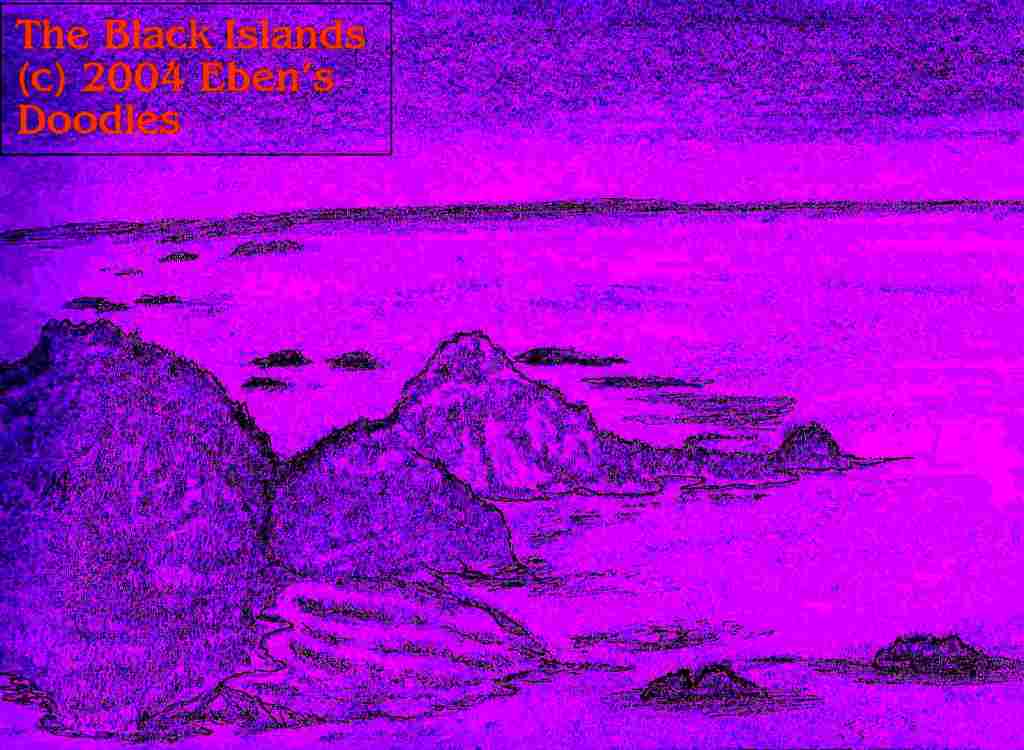
Quinn soon saw that the sign was known, as it drew the inhabitants to the shore wherever the canoe paused to trade. The traders seemed in no hurry to leave port at one point, and Quinn decided he had had enough of them. He started climbing up into the mountains of the island. How inexpressibly wonderful was the feel of the good earth beneath his feet once again? He hardly could touch it and not weep for thankfulness. It spoke so many good things to him, he felt his heart almost burst. But the earth could say only so much. It too was sick, and needed a healing. He had to go and seek Father Spirit, and find healing for his own spirit if he could. He did not care if the canoe sailed off without him and left him in this strange place. Somehow, he felt more at home in the Black Islands than he did on board the wicked vessel of the northern traders.
He came to a place where the rocks had been pulled apart, perhaps in splitting apart of the earth. Huge portions of the mountain were gone, he saw, but when he looked for the rocks, they were not lying in heaps below the mountain. Where had they gone? It was as if they had flown upwards into the air and continued, escaping the earth, and that was not possible.
Someone had taken the rocks away? What would anyone do with so many stones? He could not imagine. They would build many stone villages, almost beyond number. No, it hadn't happened that way. Rocks were plenty enough other places. Someone had come, not for rocks to build with, but for something or somethings fashioned of the rock. But who had fashioned the rock of the mountain in so valuable a way that someone would come, with many to help him, and take away whatever it was?
The mystery held him at the spot, as he gazed up at the huge cavities in the mountain. Their were six gaps in the mountain. One showed signs of fire, for the rocks were scorched. Another was scattered about, as if it had been smashed with a giant stone hammer. The remaining four had been taken outright, with no stones left behind.
It was then he realized the gaps were figures, for the rock had been cut out around them.
"They must have been great warriors!" he thought. "They stood as tall as the mountain! But why did someone take them away from their native island?"
He slept there, but it was cold, and he was forced down by the early snowfall (which was a marvel to him, but chilling to a Southerner's body), and returned to the village. Here he could have asked his questions, but he wondered first what he should do--continue with the traders, or remain, or see if he could sail from there to the north in another canoe.
He tried his Shos-Shone language with the villagers. They smiled and shook their heads. He next used sign language. They still shook their heads, and signed that it was too late in the year, and the way was too far for their canoes. He went to the canoes he found--these were small and had no steam engines--and were oared and sometimes oared and sailed. But their owners shook their heads when he tried to ask them if they would take him, as he pointed, to the north. It was the same answer: too far, too late in the year.
None of the villagers wanted to take him anywhere, and the traders were gathering themselves on board their canoe. Quinn realized he had to go with them. The door to the Black Islands, though they were beautiful to his eyes, was shutting.
Before he could go, however, the villagers tried to sell him things made of wood. They were figures, he saw. But whose? he signed to them. They looked at him with amazement. "Gods of the Ancients," they responded. What were they called? he inquired. They signed the letters of each god's name: LIN KUN, JEFA SUN, ROO SA VED, WAS SHIN TUN.
Where they taken from here, from the mountain of this island? he had to ask.
They all nodded, laughing. "Long ago! A great king of the holy countries of the south came, and he took them away on his big, flat canoes. He had many men to help him. He paid our people well. Many became rich helping him. We were sorry to see the great king go. He was kind and good, and hurt no one here, besides paying us well.
What was his name, this Great King?
"JO SEP," they signed.
Quinn did not know that name. He wondered if they knew anything more. "Did he speak to your forefathers any good words? "YES, HE TOLD US OF YESHUA, THE KING OF KINGS. WE BELIEVE IN YESHUA NOW, AND FOLLOW HIS TEACHINGS. WE ALL LOVE YESHUA, AND KNOW NO OTHER GOD, FOR HE IS GOD, THE SON OF THE MOST HIGH GOD. WE DO NOT CARE IF HE TOOK AWAY OUR OWN GODS, FOR YESHUA IS MUCH BETTER."
Quinn's head and heart spun, as they signed these things to him. He had never heard anything like it before. What could it mean? Was there really a One such as Yeshua, the "King of Kings, the Son of God? And how was He 'much better' than their old gods Lin Kun, Jefa Sun, Roo Sa Ved, and Was Shin Tun?"
But there was no time left to ask further, for the traders' canoe was preparing to depart. Did the Father Spirit have such a Son? How could he find out? Would the Father Spirit tell him?
Even as he gritted his teeth and climbed back on board the Crescent City, he felt something was changed. It was like a shadow fell across him. He knew he had to go, but somehow the voyage and the journey had become more serious than the first part of his itinerary. He sensed it.
To strengthen his heart--which felt weak from forboding--he went to a place apart from the traders and sat and chanted Shos-Shone and also Lakota songs--at least, they had been known to his people for a long time, whether they had first sung them or not. The first was brief, expressing his heart sadness, the second much longer.
"Sometimes I go about pitying myself while I am carried by the wind across the sky."
The second was more self-forgetful and healing.
"Father Spirit, teach me stillness as the grasses are stilled with light.
Father Spirit, teach me suffering as old stones suffer with memory.
Father Spirit, teach me humility as blossoms are humble with beginning.
Father Spirit, teach me caring as the mother who nurses her young.
Father Spirit, teach me courage as the tree which stands all alone.
Father Spirit, teach me limitation as the ant which crawls on the ground.
Father Spirit, teach me freedom as the eagle which soars in the sky.
Father Spirit, teach me resignation as the leaves which die in the fall.
Father Spirit, teach me regeneration as the seed which rises in the spring.
Father Spirit, teach me to remember kindsness as dry fields are blessed with rain..."
He certainly had no desire to be on this particular canoe (for all the grief the actions of the traders caused him daily), but he was there for one reason, and that was something only his destination would satisfy, one way or the other. As if the Father Spirit meant to show Quinn he was obedient to the vision of his heart, and approved of his decision, the clouds formed a great "R" in the sky as the sun set. It was gold and pink and colors unnamed--more beautiful than any beads or ornaments fashioned by the most cunning craftsmen.
"You are my 'R', a voice spoke to him. "I will guide you!"
Now there was no greater hero, no greater Argonaut of the spirit, no great Alphabetic Champion, than Quinn Ceylon, one-legged or not.
But before he had accomplished anything considered great, he finished his chanting, and went directly to the cages. They stank and were very filthy, the slave children inside wearing rags or nothing at all.
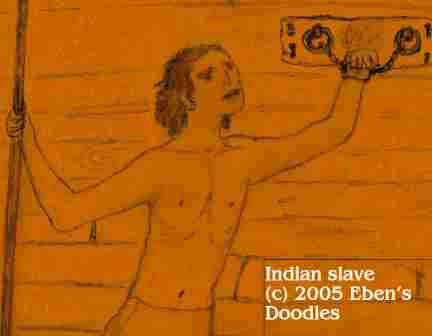
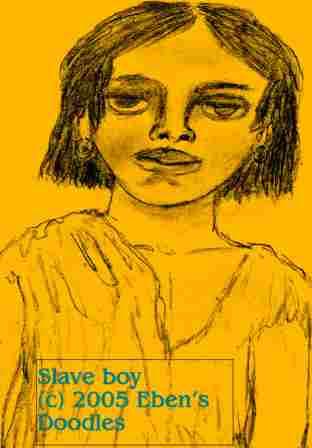
Scraps of food had been thrown in, and gnawed bones drew masses of flies. Yet though he risked the trader's wrath, he put his hands in, comforting the children, who pressed against his hands as if he could protect them against the traders. The little girl had fallen very ill, and could not stand to greet him. He called to her. She could not speak, her face was swollen with fever. He got her water, and handed the water to the boys to give to her. She could drink but a sip of it. He reached in as far as he could, and just managed to touch her arm. She began to shake. Then the most remarkable thing happened. The fever left her, and she found strength to stand up. She came to him, and her skin felt cool, whereas a few moments before it had been burning hot to his touch!
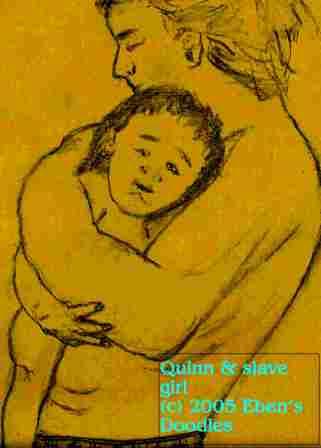
Quinn went back to his usual spot by himself, and looked at his hands. There was healing in his hands! His hands held medicine in them! Had the Father Spirit put healing in them?
It was only a short time before the word spread about what had happened at the cages. Nothing like it had been seen before. The traders' looks changed completely, utterly. They looked remorseful, perplexed, awed from head burnoosed heads to slippered feet, all at the same time. Some began wailing to themselves, beating their chests. Others sank to their knees. The Crescent City nearly was forgotten, as even the captain was overcome by the news of the healing on board the vessel.
Called a prophet, Quinn soon was approached by the more courageous of the crew. One knew enough sign language to ask him to touch him. He had a bad disease in his hand, from a bad cut, and nothing would heal it that he used--herbs, urine of goats, spider web, nothing availed. The man wept for Quinn to touch his swollen, rag-wrapped hand, from which fiery red lines extended up his arm.
Looking at how wretched the man was, even though he was a cruel trader, Quinn's heart was moved for this enemy. He knew, from the sight, that this man would die soon and be thrown overboard to the man-eating fish. Would he not be his enemy still, even when healed? But Quinn touched the sick hand. The man gave a shudder, and fell to the deck. It was if his hand was struck by lightning, yet the man cried out, "It is God-touched!" to his fellows, who signed to Quinn what he said to them.
"No!" Quinn signed. He was horrified. Would they think he was God? These were ignorant men, like beasts. They would exalt him to Godhead? He could not let that happen.
"No, I am a man like yourselves! You must not say God touched you.!"
But the now healed man rose up, shouting, then dancing in joy. "I know one thing, whether you be God or not, that I was sick before in my hand, and now I am healed!"
The whole ship marveled, even more than at the news of the fevered slave girl being healed by Quinn's hand.
The rest of the journey, which was cut short because the ship's captain only wanted to return home with this divine healer as the prize, was most strange. The traders now hung on Quinn's every move and word. They could not do enough for him. "Release the children to freedom," he said. This one word from him was enough. The traders immediately opened the cages.
"If I cannot get them to their own people, I will find them homes if I can," thought Quinn. He knew he could not trust the mariners to care for them.
The Crescent City sped toward the mouth of the Kolumbia, which sent out a stream that emptied into the Turtle Sea, not in the Western Ocean as in former times.
Trembling, Quinn touched his right leg. But it remained lame. He could have wept when nothing happened. A moment later he felt something on a finger of the hand he had used. He looked. It was an ant. Then he remembered the song he had sung, and the part about the ant, and his tears did not flow, for he understood the ant on his finger had been sent to teach and remind him. Thankful, he placed his little brother on the deck where it could go on its way.
Quinn's comforting thought: 'I will guide you.' How else could he have faced so unknown a future as the one already looming before him on the horizon, where he could see as they sailed closer to the great river's mouth walls of water crashing against walls of stone.

Pilgrim, Bluebird, Starboy
Quinn arrived safely at Trebizond, a port of the Empire of Kolumbia that opened on on the Turtle Sea. He set to work finding passage for them, for he intended to send them home to their own country. No captain, it seemed, wanted to take his money, and protested that it was the wrong time of year for such sailings.
Unless Quinn bought a canoe and sailed with the children himself, he could not return them to their own people. But he did not know how far it was, or even where they lived, and so he could not set out on such a journey. Why should they all perish on the way? No, he decided, until he could find passage on a steamer, he would have to find temporary lodgings for them in Kolumbia.
It was not easy to do, he soon found. Kolumbian society was far different from his own. They did not welcome wayfarers, despite their being many traders among them. He could not even buy lodgings if he intended to remain more than a short time. They called anyone who was not of their Isman Way a dog and worse, and he walked the streets of the port in vain with the children, as women hurled insults at them through their windows, and children threw stones, and men gave them evil looks.
Quinn brought some provisions, then took the children, and they left the port and climbed into the countryside, to see what there might be for them. As they passed through the hills and into the mountains, Quinn felt eyes upon him, but could not tell whose. As they entered the deep forests, then it happened. He saw movement of someone ahead, then behind, and even to the side. They continued walking, and finally he saw a man step into the path ahead and wait for them to come up to him.
When Quinn approached, careful to be ready for an attack, he saw the man was smiling. He was an old man, and wasn't even armed with bow or knife.
He old one smiled even more, then with signed for them to follow him. They left the path, and followed their guide through thick trees, even over streams, deeper and deeper into the forest. It seemed a very long journey to the children, and Quinn was hard pressed to carry the tired ones.
Suddenly, a clearing opened up, and there were tents all around, sheltered by the leafy trees and pines.
Quinn was amazed. A village of people very much like his own people!
Children, men and women crowded around them, not saying anything for a time, but the old man gestured to them to follow him, and he led them to a bigger tent in in the midst of the village. He stopped there, and opened the door, inviting with his waving hands for them to enter. Quinn stepped inside with the girl in his arms, and saw as soon as he could see in the gloom that the tent held everything they could wish. Was it there's?
The old man smiled, left them fresh water in a stone pot, and went out. There was much talking, none of which Quinn could understand.
He listened carefully, though. Some minutes later the words sounded like those he knew. He listened again. Yes, he could tell what some things were that they were saying! As he continued to listen, the meanings became clear. The people were asking about the strangers, and the old man was telling them.
Quinn was amazed at how much the old man knew. How could he know so much? Had he been following them in the cruel port city? He must have been shadowing them!
The children need homes for a time, the old man explained to the people. "They can have my tent as long as they need it."
"But you are our chief!" someone protested. "Where will you go?"
There was silence.
"I am going away from you now. My time has come. I am going to Shouting Mountain, to see if the One has come Whom we desire. I do not wish to die here, among the enemy who hate us. I will go to Him on the mountain!
Quinn's eyes filled with tears. There was silence still, but he thought he could hear the soft whisper of moccasins as the people melted away.
Quinn saw to the needs of the children, as they ate the good things the old man had given them, and lay down later on the soft blankets, enjoying the shelter of the beautiful tent.
Quinn looked out from time to time, hoping to see the chief, to invited him in. Only once did he see him, but the moment Quinn saw him the old man signed that he did not need the tent. He was going away, and indeed he was, for he had a pack on his back, and was setting out at that moment. Quinn could not help himself, and followed the old man down the path. But the old one turned around and signed for him to return to the village. Smiling, shaking his head, he made it clear that he was going to find a good thing, but he would be doing it alone.
Quinn turned back. By this time it was dark. The starlike eyes or eyelike stars in his hair had begun to glow. When he slipped back into the village, he felt the surprise and even shock of the people, though he saw no faces or eyes, all the tent doors were shut for the night.
Quinn went into the gift of the chief's tent. He was very weary and lay down, but his thoughts were racing. Shouting Mountain? The One whom the people desired might come there? Who was this great One?
In the morning, he stepped out of the tent. Quickly, the people of the village came to him. They bowed to him, some men exclaiming in their language that he could not understand, "Welcome, you are a stranger, a pilgrim, but you are the Bluebird, the Boy of Stars that we knew would come here someday. You will lead our people to the Desired One--for you will know where He sets his feet down upon the Earth when He returns. We have many wise sayings about this, and so we will be your servants.
Quinn was shocked, and also grieved. He pulled the bowing ones up. "But you have a chief! It is wrong for you to make me sit in his place at the council fire!"
They all shook their heads. "No, he has gone from us. He has taken our love and gone, and we will not see him again. But he has given you and your children to us. We will love, and serve, and honor you as our chief! O Bluebird! Starboy!"
Quinn was horrified. He had no desire for such an honor. He was on a solitary spirit-journey. What would he do with a village of people, and a family of children as well. Would they even insist on giving him a wife?
He began to weep. I cannot! I am journeying. Please love these children, until I return for them. I will send them back to their own people when I can.
The people all looked at him as if he were not speaking. "We obey our former chief. He has given you to us in his place. We must honor you as our leader. We love and serve you all your days, and your children with you!"
Would could Quinn say or do? He could not dishonor the chief who had been so gracious to him, in giving them refuge. He could not make the chief's words a lie.
He bowed to the people in turn. "I will love you and serve you all my days, my people, as the great Spirit of all gives me wisdom. But you must let me go on my journey for a time, and then I will return here. Will you do that?
The people conferred, but did not take long doing it. Excitedly, they croweded round him, lifting him up. "We love you, we serve you!" they chanted. They began songs, celebrating the event of their new chief coming to them.
A festival began. Food was prepared, as the dancing began, and Quinn was seated at the place of honor, with "his" children.
Some of the older men approached him, giving their names to him. They began to tell him many things, about the people, about their enemies, and also how they came to live in such a deep place in the forest.
"They try to force us to believe in their god," the men told him. "But we will not accept their god and religion. He is a cruel god, and they are cruel people. They kill us, torture us, if they can, to make us into their slaves. They have tried this for a very long time. Our fathers and their fathers had to fight and run into the deep forest. Here we are free. But they can always find us, if we let them, so we live alone, and do not trade with them. When we need something, we send one of us out to get it, and in the city he is not known. But if he should be taken and made to tell about us, he will not do it. They will torture him, but he will not say anything. This is the way it must be for us. We are not happy, but until the One comes to set us free, we must live like this, pilgrims in our own land--for all this was our land, not theirs.
"Where did they come from?"
"From the west and the south," they replied. "But this is our land. They are too many for us to drive out, and so we must hide like this to be free."
Quinn nodded. "I can go among them, and they do not mistreat me. Why do they mistreat you?"
They do not treat strangers and wayfarers the same, not as they treat us. They will wait to see what you do, or whether you will take their religion. But as for us, we are only slaves in their eyes, since we refuse to bow to their god and their holy men."
Quinn recalled the ship, and how suspicious the mariners had been of him, and because they wanted his money they let him go with them. What if he had no money? What then?
Quinn knew what he would do, to keep his life and not be tortured. So he was not frightened by the words of his village leaders.
Some days he remained in the village, until the children had found friends and seemed happy there. But he told them he must go away for a time. Women had come to be mothers to the children, and they comforted the children who were unhappy when he said he was leaving them.
He remained a longer time, hoping the children would not be so unhappy.
He finally took the boys with him on a short trip, to show them the way he was going. Foothills, in one place, were dusted with snow, where they had climbed high enough to find the home of winter, where it never grew warm.
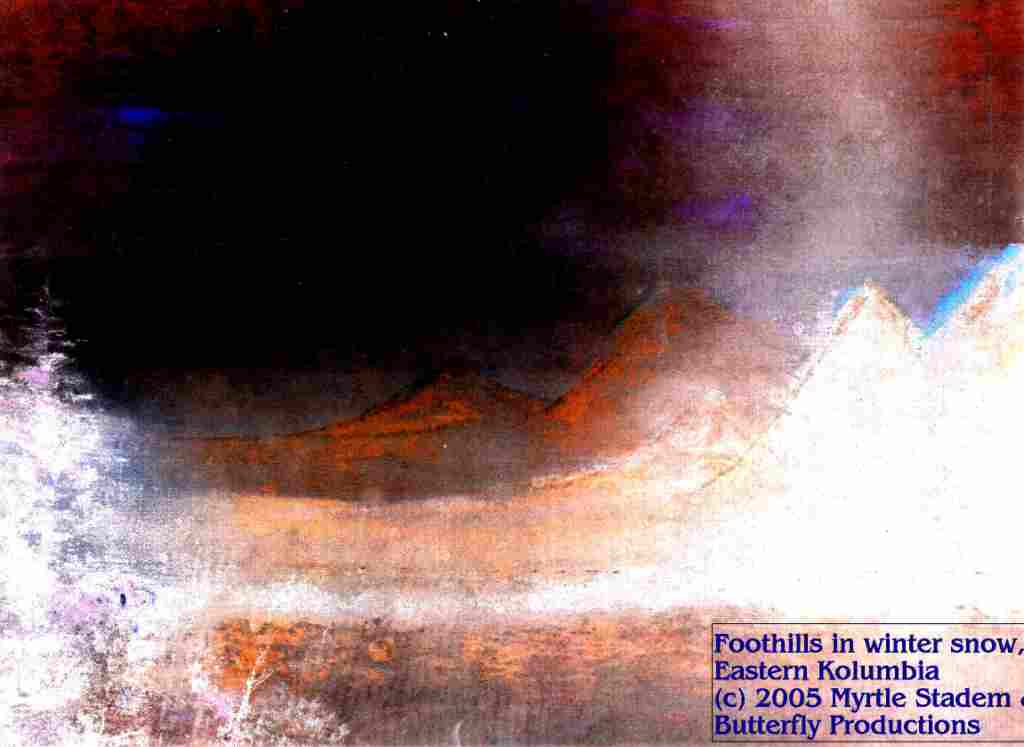
They passed down from there to a village of the Kolumbians, set on the path to the western mountains. There he stopped in the market place, and found a number of beggars, sick, and old people.
He knelt and prayed for some of them, who were the worst in need. Immediately, eyes opened that had been blind. A woman with a terrible growth on her face, she also was immediately healed. The village exploded with the news. A holy man had come, with healing powers. Oh, he didn't look like a holy man, but he had to be a man of divine parts to heal people of blindness and flesh-eating growths.
People flooded into the village from all around, and Quinn was hard put to deal with the crowds. He began to weep, seeing so many in need. His heart nearly broke, at the pain and suffering he saw in so many.
He had not known such powers as he was using that day. He had only felt their opening up within his heart and hands, but here they came forth to full flower! He was so happy, yet he wept for the people even as they were healed at a touch and a prayer to the Great Spirit.
When he saw the holy men come, questing everyone, then casting angry looks toward him, he saw it was time to slip away. As he could, with his children alerted, he slipped from their midst so quickly and silently that no one could follow them.
When they returned to the village, Quinn saw the children to bed, but he asked the boys what they had seen.
They told him, but he had to correct them. "I have shown you the Way I must go. You re too young to go with me yet. Do you understand now?"
Silently, they gazed at him, and the boys nodded.
Quinn went off to be by himself and think. He gazed down at his hands. He touched his lips. "I healed no one. I praying no healing prayer. Yet they were healed, every one of them! It is not me. But who is doing these wonderful things through me? These are not the doing of herbs and colored sand pictures and chantings of the wise ones of old--no, this is something new and wonderful beyond all words!"
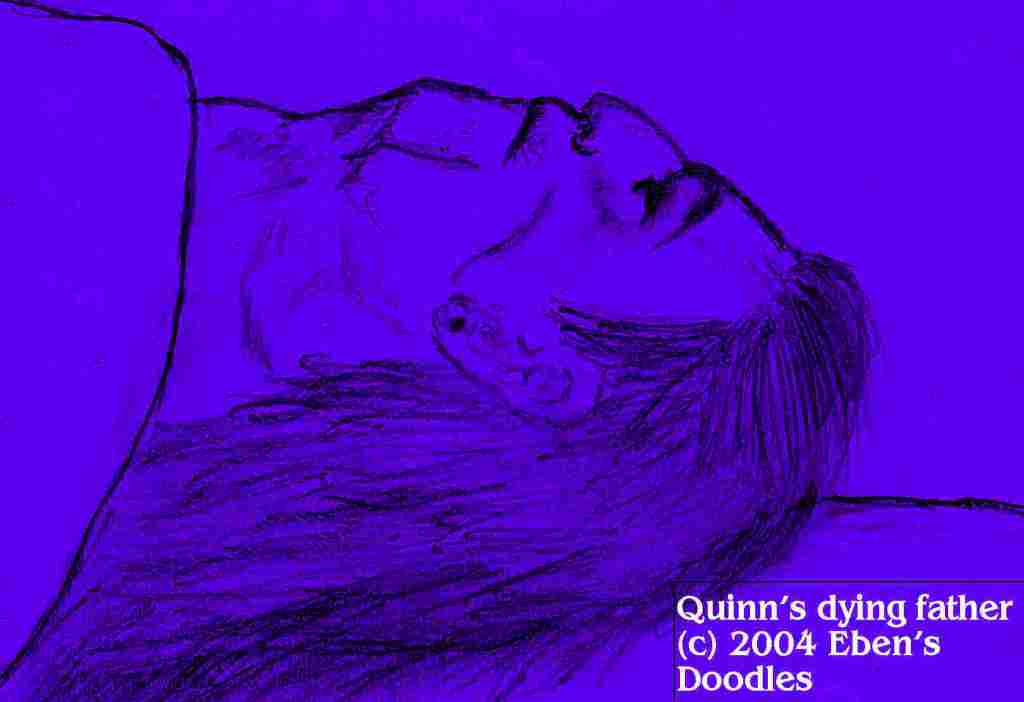
Suddenly, he saw his father. Something was very wrong, which he felt more in his heart than in the eyes of his vision-gift.
He began to weep, realizing there was no time to return to his village to be with his father in his passing to the sky-lodges.
Quinn knew then that he must continue his pilgrimage, for his father would have told him not to return, but to go on. He must find what was giving him an expectation in his heart and all through his being--was this because of the One Who was to appear, the people said, on the highness called Shouting Mountain? Only going would tell whether or not, he knew.
He was a long distance from the village, climbing ever higher, when he came to people on the path who knew the way to the great, holy city of Sealtown. "There you will find all the founts of wisdom!" they assured him. "We have many schools of wisdom too, where you can sit and learn at the feet of great scholars and teachers of the holy law. Isn't that something you wish for yourself? Even if you look strange you may find favor there, if you seek wisdom and wish to gain entrance to the holy faith."
Quinn could not deny that he needed wisdom. He felt a great need to know more. He wanted to find what burned in his own heart. What would stop the burning except the Water of Life?
He asked the people who were going to Sealtown if they knew of the Water of Life?
"Oh, yes!" they said. "The city if full of water, and the river is the one that flows all the way to the western sea, straight from the heart of the mounain."
What mountain, what river?" he asked.
They could not believe that he could be so ignorant.
"Why, it is the River of Isma, and the Mountain is the Divan of the Prophet! Everybody knows that!"
Quinn said nothing, and digested what they told him.
"So they too know of a Prophet coming to the great mountain," he thought. "Are they the same One, or two different prophets?"
He knew he would have to go and see for himself.
The way grew more difficult as they climbed upwards. Inns were fewer, and it was dangerous. Bandits, robbers, murderers abounded. Some of the bands were many in men, and they came at the wayfarers with weapons and horses. They had to flee many times to safety if they saw them in time.
Fortunately, they had Starboy in their midst. No one dared attack them at night, not when his head glowed with five stars. And in the day they were safe, for they could see anyone coming, or see to avoid the places of ambush where the robbets lurked.
Quinn's sandals wore out, and then he was walking without them. By that time, the land route was too high, being above the snow line, and so they had to descend. On the way south that skirted the Mountain of Isma they found rivers that took them by hired boat to others that by a round-about way got them in the direction of Sealtown. To cross directly to Sealtown was impossible, not unless you wish to freeze to death on the heights, he was told.
It was a longer time going round the Mountain, then reaching it. As Quinn journeyed, he thought often of the chief who had gone up the Mountain. Had he found his Desire?
Holy Sealtown the capital, the seat of the Kaliph! At last!
Below in the spreading valley, though it was but a high cleft on the side of the Mountain, a city of gleaming gold towers and blue and green tiled buildings filled every bit of the space. As far as he could see the city was there, and all gleaming and beautiful to the eye!
The people with him, too, were taken with the view.
They hurried down to their various destinations, but on the way pointed out to Quinn the various medresses or schools of Isman he might go into to inquire.
You will be welcome there," they assured him, having enjoyed his protection all during the journey. Many times they would have been attacked, they knew, except for Quinn's presence and unearthly appearance.
They no longer knew what to make of him, their glances told him, but they thought their own holy men would know what to do with him.
"Cover you head," they advised him before they even set out for the city below, "for they will think you are a devil, when they see you at night, and stone you!"
Quinn saw that they meant their words, and he nodded. "There must be ignorant people in the city, along with all the wise ones."
He covered his head as it grew to dusk, and he still had not gone in at any of the schools and was still wandering in the outer parts of the great city.
"I will wait until the next day. I wish to see the city first and how the people live."
An old man, like him, had just arrived, and the sight of so much splendor, unimaginable glory, overwhelmed the simple man from some tiny country village as he gazed at the royal stables.
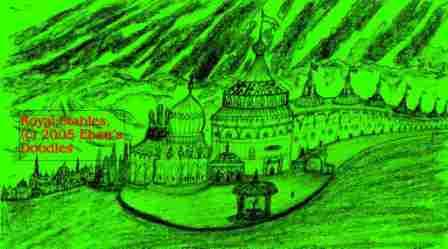
Quinn the Pilgrim continued walking, alone now. But to gain entrance to the main and central part of the city, it was necessary to take a boat--for the inner city where the Kaliph resided was protected not only by high fortified and towered walls but by the wide waters of the great river.
On the steamboat he saw a poor widow and took pity on her, for he could tell her heart was silently crying out for help.
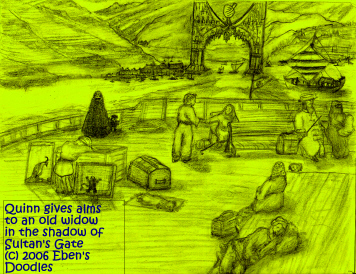
It was better for him traveling alone, he thought. He could hear things now that the talking of others hushed. He listened to the hearts crying out all around. It grew to a great chorus. In the busy marketplaces, where no one seemed to care about holy things, he heard the same chorus. All the hearts were crying the same thing. But on their lips were prices and the names of things and all manner of business and gossip and trade.
"These are most strange and unhappy people," he realized. "They do not speak from their hearts--for fear prevents them. They and their hearts are divided. They do not know what peace is--all because of fear of each other and fear of the God they say they revere."
He also saw the many beggars and the sick and helpless, who thronged the splendid, gilded gates to the magnificent public buildings and temples.
His heart was captured by them, and he could not help but pause to pray and touch some of them. Immediately, they were healed.
He had to hurry away, for an excited crowd soon developed.
"I will go next to the holy schools," he thought.
At a gate he met the porter and various keepers of the gate to a school, and they went to inform the iman that a stranger had come to inquire.
The iman sent word out, inviting Quinn to come into the courtyard. Quinn was admitted, and there he found a dignified, older man in beautiiful robes waiting for him.
When Quinn hesitated, not knowing if he should bow or not, the man gave him a displeased look.

It was better for him traveling alone, he thought. He could hear things now that the talking of others hushed. He listened to the hearts crying out all around. It grew to a great chorus. In the busy marketplaces, where no one seemed to care about holy things, he heard the same chorus. All the hearts were crying the same thing. But on their lips were prices and the names of things and all manner of business and gossip and trade.
"These are most strange and unhappy people," he realized. "They do not speak from their hearts--for fear prevents them. They and their hearts are divided. They do not know what peace is--all because of fear of each other and fear of the God they say they revere."
He also saw the many beggars and the sick and helpless, who thronged the splendid, gilded gates to the magnificent public buildings and temples.
His heart was captured by them, and he could not help but pause to pray and touch some of them. Immediately, they were healed.
He had to hurry away, for an excited crowd soon developed.
"I will go next to the holy schools," he thought.
At a gate he met the porter and various keepers of the gate to a school, and they went to inform the iman that a stranger had come to inquire.
The iman sent word out, inviting Quinn to come into the courtyard. Quinn was admitted, and there he found a dignified, older man in beautiiful robes waiting for him.
When Quinn hesitated, not knowing if he should bow or not, the man gave him a displeased look.
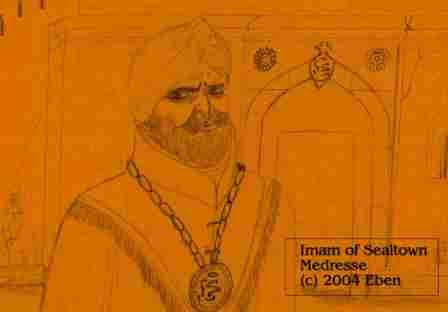
Quinn said, "I am sorry, I do not know you ways."
The man smiled. "I understand. Now why do you come to us, for you are a stranger in our country?"
Quinn explained. "Yes, I have come a long way. I have heard much of your wisdom and your learning here. I want to know what they are, whether they will tell me what my heart burns to know."
The iman stepped closer, and his eyes seem to burn as he gazed deeply at Quinn.
He did not say anything more. He beckoned for him to follow.
The iman left him when he brought him to a chamber inside the school. A man nodded to Quinn. "Follow me to your room, for you are to be our guest."
Quinn followed the man, and was shown a single room with a bed and a window looking at the flowered and fountained courtyard.
"You will not eat with us until you are one of us, but your food will be served here."
It was so as the man said.
Quinn was brought water for his washing, and also juice and bread and cheese for his meal. He ate and then rested, then when no one came, he slept. He awoke early in the night, hearing the chanting and singing of the students.
A holy man had sung first, calling them to prayers, and through the school voices joined in response.
It was a strange feeling for Quinn. They all seemed to be one, though divided in heart. Their voices were one voice, and the whole school shook as they sang mightily. Gradually, the singing died away, and sleep seemed to come to the school.
Yet the silence was broken three hours later as a holy man sang out and the whole school responded.
This happened again, again after three hours.
"This must be a holy place, indeed," thought Quinn. The singing was a wonderful thing to his ears. He nearly forgot, hearing the singing, what he had felt about their divided hearts and their knowing no peace.
Quinn went early into the courtyard, for it was a beautiful place. It contained fountains, flowers, even trees. He felt the grass of the ground where the tiles ended, and it was like the whole earth calling to him along with the flooding morning light and the birdsong in his ears. All things rejoiced in him, calling to him to join them, but somehow it seemed wrong in this place. This school and its wisdom did not join in the rejoicing he felt in every part of his spirit. They wanted beauty, and beauty was everywhere, yet he saw that it was not beauty in their souls and spirits--no, from that too they were strangely divided.
It made him feel sad for them. Yet the morning had begun, and he had much to learn, he felt. His heart soared with the thought that he had come so far, and now he was at least going to find wisdom and truth--maybe then his heart would cease to burn and be satisfied.
After several days, however, the division in the hearts around him made Quinn's own heart sick, and he could not remain any longer. They are not serving the Truth, though they talk constantly about it, and boast that they only know it. He knew that the iman would be very angry if he told him this, and so he quietly let himself out, and the guards at the gate bowed and permitted him to pass, as he was still officially a guest of the iman's.
Once outside the gate, Quinn's lungs filled with fresh air, and he felt released in his spirit. The sun shone once again on him, as though he had been hidden away in a deep, dark cave. He felt free--and then he knew what he had left--a house of bondage, where men enslaved young men with the shackles of religion, while bowing to their god.
His heart rejoicing in his refound freedom, Quinn continued exploring the great city and its environs. He could see the splendors of it, but his heart sank when he saw the beggars and the sick and the oppressed multitudes that suffered amidst the splendors. Encountering a place where unwanted babies are abandoned, he is so overcome by the sight and reminded of how he nearly suffered the same fate--being eaten by scavenging dogs-- he grieves, and then stops to pray.
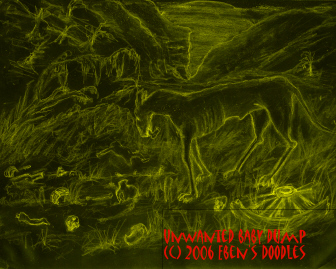
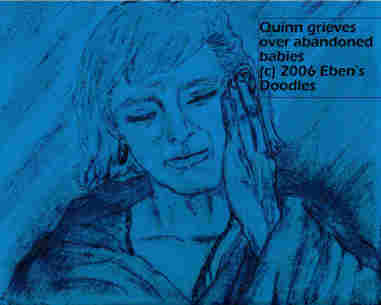
What can he do? He is only one person in a city containing multitudes he could never number. People could sense something in him as he approached, and called to him in distress. He reached out to them, and they were, more often than not, healed.
The Bluebird's heart also goes out to the many homeless.
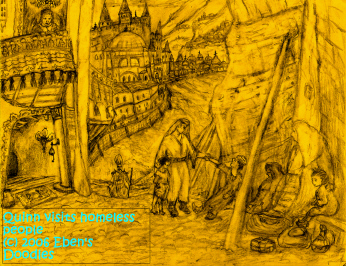
So many people are starving too, and he does what he can for them with the money the better off thrust into his hand for healing their children.
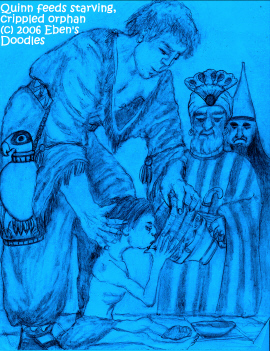
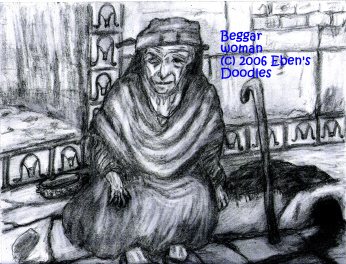
The people are hopeless, even those who work and can afford the high expense of a house and household. A fishmonger calls to him, "Holy youth, come and help us! I can see you have the Light--remain with us! Don't leave us, please!"
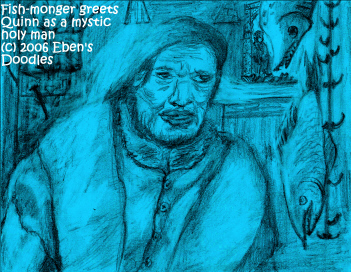
The fishmonger's wife too sees Quinn, but her heart does not cry out as her husband's does, for her heart has died even while her body continues to live.
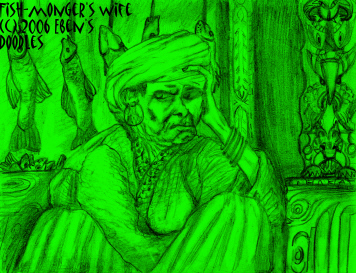
He finds that there are many thousands of slaves in the city as well, so he goes to a slave trader's compound, where the slaves are kept and shown to prospective buyers.
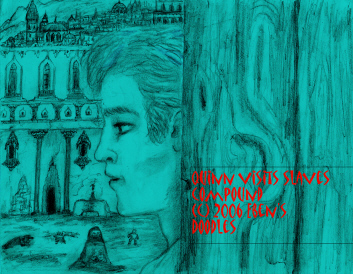
The slaves are made to stand before prospective buyers.
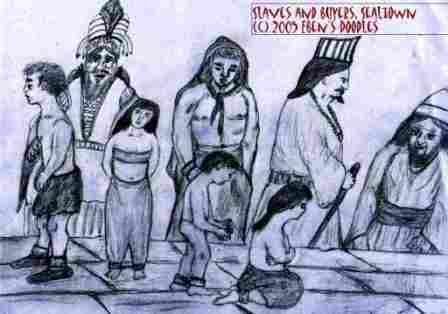
Quinn goes to see the slavemaster.
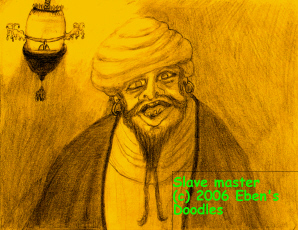
He buys all the slaves he can pay for, then leads them out of the compound, and arranges for homes for them--all paid for with the money given him by grateful parents of healed children. He has nothing left, when he is through providing for the freed slave children.
The crowds that gather to witness the healings he performs become too large and unruly for him to deal with at times, so he is forced to flee from them by going outside the walls. Here too, there is no escape for him, there is terrible distress and pain, he discovers.


Please go to the Directory and Linking Home Page for the concluding part of "Pilgrim, Bluebird, Starboy," then the remaining parts of Chronicle Sixty-One: "Zu the Birdman," "The Tiger of Hagi," and "The White Stone."
Retro Star Directory and Linking Page

(c) 2008, Butterfly Productions, All Rights Reserved

